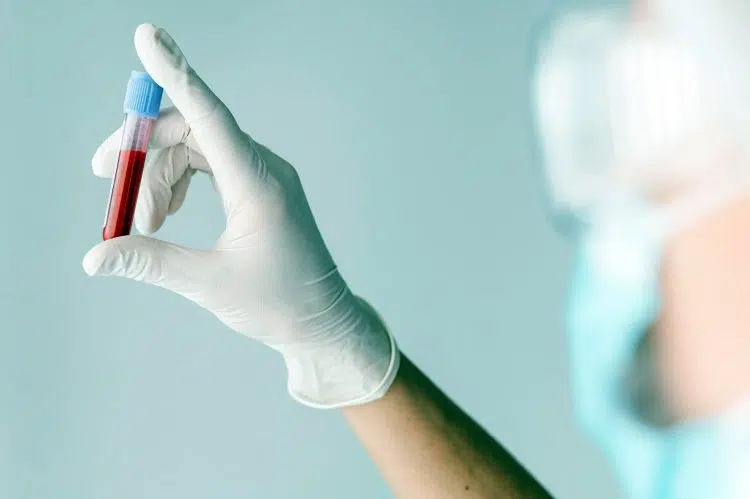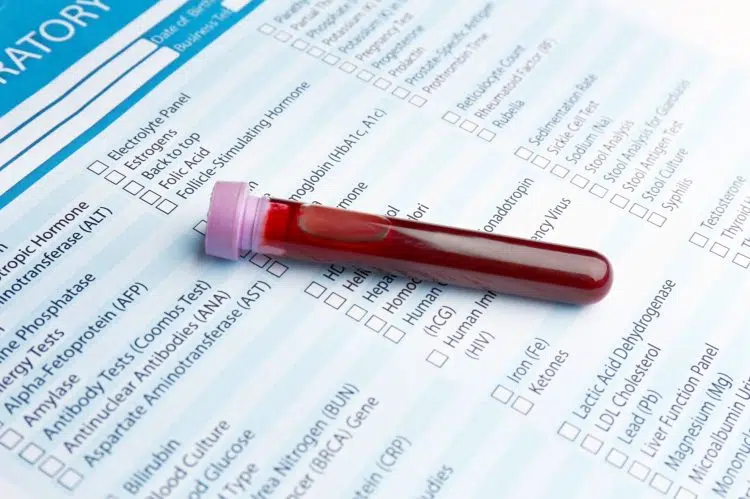Many people spend countless hours in the gym, tackling meticulously planned workouts and counting each calorie they put in their mouth. However, only a few ever achieve their physique transformation goals.
Most bodybuilders overlook the fact that what’s happening inside their body is just as important as what they see in the mirror.
There is only one way to know what’s happening inside — bloodwork. Regular blood tests are crucial for everyone, as they reveal everything from your hormone levels to nutritional deficiencies.
However, bodybuilders, especially those using anabolic steroids, need them even more to monitor their overall health and give early warning signs of problems.
Anabolic steroids can cause severe, long-lasting, and, in some cases, irreversible damage. They can lead to early heart attacks, strokes, liver tumors, kidney failure, and psychiatric problems. In addition, stopping steroid use can cause depression, often leading to resumption of use. (1)
To get the most in-depth bloodwork analysis, you will need more than the basic health panels. In this article, I will take you over the most important blood tests you need to get done to analyze the markers that can influence your well-being and longevity and unlock your full potential.
The Essential Blood Panel for Bodybuilders
Understanding and optimizing your bloodwork can boost muscle growth and slash recovery time by identifying nutritional deficiencies and fixing hormonal imbalances. It can also help detect potential health risks before they turn into major setbacks.
So, here are the things that you should be testing for:
Testosterone (Total, Free, and SHBG)
Testosterone, or test, is the most important hormone if you’re aiming to build muscle mass and strength.
A review published in the Sports Medicine journal found that testosterone is an important factor for muscle mass and strength gains in men and women. Furthermore, resistance training can induce acute increases in testosterone levels. (2)
Total testosterone levels will give you an overall picture. In contrast, free testosterone (the active form) and sex hormone-binding globulin (SHBG) tell you how well your body utilizes this crucial hormone.
Men over 40 should get regular blood work done to monitor their T levels.
Ideal Range:
- Total Testosterone: 300-1000 ng/dL (nanograms per deciliter)
- Free Testosterone: 8.7-25.1 pg/mL (picograms per milliliter)
- SHBG: 10-57 nmol/L (nanomoles per liter)
Note: The ideal ranges mentioned in this article are for men.
Estrogen (Estradiol)
Testosterone is the male sex hormone, whereas estrogen is the female counterpart. That said, men and women have both hormones in varying quantities. Higher estrogen levels in males can lead to water retention, fat gain, and mood swings.
Furthermore, the infamous gynecomastia, also known as man boobs, is often caused by an imbalance of estrogen and testosterone hormones. The enlargement of the breast tissue in men occurs when the estrogen levels rise above their normal levels.
Ideal Range: 10-40 pg/mL
Thyroid Panel (TSH, T3, T4)
The thyroid is a butterfly-shaped gland in the neck that produces hormones that control how the body uses energy.
Thyroid hormones are responsible for regulating metabolism, energy levels, and protein synthesis. These are all vital for muscle growth and recovery. (3)
Ideal Range:
- TSH: 0.4-4.0 mIU/L (milli-international units per liter)
- Free T3: 2.3-4.2 pg/mL
- Free T4: 0.8-1.8 ng/dL
Cortisol
It is the body’s primary stress hormone and is essential for survival. However, chronically elevated cortisol levels can hamper muscle growth, spike fat storage, and reduce the body’s ability to recover quickly.
Resistance training can also impact other hormones like cortisol, which can influence your overall health.
Ideal Range: It can fluctuate depending on the time of the day. Here is the average range:
- Morning: 5-23 mcg/dL
- Afternoon: 3-16 mcg/dL
Complete Blood Count (CBC)
CBC is one of the most basic health panels. This comprehensive test checks your red and white blood cells, hemoglobin, and hematocrit. It can help identify anemia, infection, and other conditions that can hinder performance.
“Androgens, steroids, and even dehydration can elevate red blood cell count. If your hematocrit is too high, you may need to donate blood,” said Dr. George Touliatos, MD (popularly known as Dr. Testosterone)
Touliatos added that PEDs can thicken the blood, and athletes should take aspirin and fish oil to reduce the risk of blood clotting.
Ideal Range: Here are the normal reference ranges:
- Red blood cells: 4.7-6.1 million cells/mcL (cells per microliter) for men
- White blood cells: 4,500-11,000 cells/mcL
- Hemoglobin: 13.5-17.5 grams/dL for men
- Hematocrit: 41%-50% for men
Liver and Kidney Function Tests
The liver and kidney filter waste products and metabolize substances, including medications and supplements. Athletes using performance-enhancing drugs (PEDs) should undergo routine liver and kidney checks to ensure optimal health.
Ideal Range: Ideal range can vary depending on the specific test. You must consult your doctor for interpretation.
Vitamin D
Although most people overlook vitamin D, it is one of the most essential nutrients you must consider. Vitamin D plays a vital role in bone health, immune function, and muscle function.
Ideal Range: 30-100 ng/mL

Iron and Ferritin
Iron plays a crucial role in oxygen transport, energy production, and optimal muscle function. On the other hand, ferritin is a protein that stores iron. Iron and ferritin deficiency can cause chronic fatigue, weakness, and impaired performance.
Ideal Range:
- Iron: 60-170 mcg/dL for men
- Ferritin: 12-300 ng/mL for men
Lipid Profile
The lipid profile is another common health panel that measures your total cholesterol, HDL (good cholesterol), LDL (bad cholesterol), and triglycerides. You must maintain healthy cholesterol levels to maintain your cardiovascular health and overall well-being.
Ideal Range:
- Total Cholesterol: Less than 200 mg/dL
- HDL Cholesterol: 40 mg/dL or higher for men
- LDL Cholesterol: Less than 100 mg/dL
- Triglycerides: Less than 150 mg/dL
Getting your blood work done can help you make necessary changes to your training, nutrition, and recovery regime to amplify your results. For instance, if you are dealing with low test levels, you should consider making lifestyle changes like getting more sleep, reducing stress, and optimizing your diet.
Furthermore, you might consider hormone replacement therapy (HRT) under medical supervision if your T levels are severely low.
Advanced Blood Tests For Bodybuilders
While the nine blood tests we’ve covered in the section above lay the groundwork for boosting muscle growth and recovery, bodybuilders also have additional avenues to further boost their progress. Here are some advanced bloodwork tests for a better understanding of your body’s functioning:
Genetic Testing
This test can reveal predispositions to certain conditions or responses to training and nutrition. Genetic testing can help maximize your performance and can be really helpful for advanced athletes.
Food Sensitivity Tests
Most people have certain food sensitivities, which can cause bloating, laziness, or reactions like rashes and acne. Plus, they can hinder your progress by slowing down food absorption. Remember, food sensitivities can change with time. Professional bodybuilders should undergo regular food sensitivity tests to get the best bang for their buck.
CMP (Complete Metabolic Panel)
This panel assesses your liver and kidney function, electrolyte balance, and blood sugar levels. It will tell you everything you need to know about your metabolic health.
Inflammatory Markers (hs-CRP)
Inflammation can be catastrophic for your bodybuilding ambitions. This test measures high-sensitivity C-reactive protein, which is a marker of inflammation in the body.
Prostate-Specific Antigen (PSA)
This test is used for prostate health screening in men, especially for prostate cancer. Intense training and steroid use can lead to elevated PSA levels in men.
Cardiac Enzymes
These enzymes are released into the bloodstream when the heart is stressed or damaged. This test can help detect heart damage, which is a known side effect of steroid use. Regular monitoring can help ensure optimal heart health. (4)
IGF-1 (Insulin-like Growth Factor 1)
This hormone plays a crucial role in muscle growth and repair. The IGF-1 test offers insights into your body’s anabolic potential. Eating a low-carb and high-protein meal rich in arginine can help boost IGF-1 levels.
FSH (Follicle-Stimulating Hormone) and LH (Luteinizing Hormone)
These hormones regulate testosterone production in men and play a vital role in estrogen release and menstrual cycles in women.
Interpreting Your Results
It’s easy to order bloodwork at home and get the reports over email. However, you must realize that these markers don’t exist in isolation. They interact with each other and must be interpreted in the context of your overall health, training regime, and lifestyle factors.
Consult a healthcare professional for an in-depth analysis of your bloodwork.
Remember, blood tests can be misleading for people who lift weights.
“People who engage in high-intensity training can encounter elevated liver enzyme levels as they are released in muscle tissue, and weight training can damage muscle tissue,” said veteran bodybuilder Jerry Brainum.
It is crucial that you get your reports analyzed by a doctor who understands the implications of strength training. You must also share all the details of your training, diet, and supplementation with your doctor so your blood test reports are interpreted correctly.
Conclusion
Let’s be honest: getting blood work done can be scary. However, they are an excellent way to ensure your body is functioning optimally and boost your overall health, well-being, and longevity.
Remember, this article is for educational purposes only. Don’t use this to diagnose or treat health issues. People experiencing medical problems should consult a doctor before taking any new supplements or peptides or changing their diet plan.
References:
- NIDA. 2024, March 21. Anabolic Steroids and Other Appearance and Performance Enhancing Drugs (APEDs). Retrieved from https://nida.nih.gov/research-topics/anabolic-steroids on 2024, May 15
- Vingren, J. L., Kraemer, W. J., Ratamess, N. A., Anderson, J. M., Volek, J. S., & Maresh, C. M. (2010). Testosterone physiology in resistance exercise and training: the upstream regulatory elements. Sports medicine (Auckland, N.Z.), 40(12), 1037–1053. https://doi.org/10.2165/11536910-000000000-00000
- Teixeira, P. F. D. S., Dos Santos, P. B., & Pazos-Moura, C. C. (2020). The role of thyroid hormone in metabolism and metabolic syndrome. Therapeutic advances in endocrinology and metabolism, 11, 2042018820917869. https://doi.org/10.1177/2042018820917869
- Sullivan, M. L., Martinez, C. M., Gennis, P., & Gallagher, E. J. (1998). The cardiac toxicity of anabolic steroids. Progress in cardiovascular diseases, 41(1), 1–15. https://doi.org/10.1016/s0033-0620(98)80019-4
Tip: If you're signed in to Google, tap Follow.












